As the Island prepares to celebrate the 70th anniversary of Liberation Day, Audrey Falle (87) has spoken of the ‘tearful’ moment she said goodbye to her cousins, aunts and uncles in 1942 as they waited at the harbour to be taken to mainland Europe.
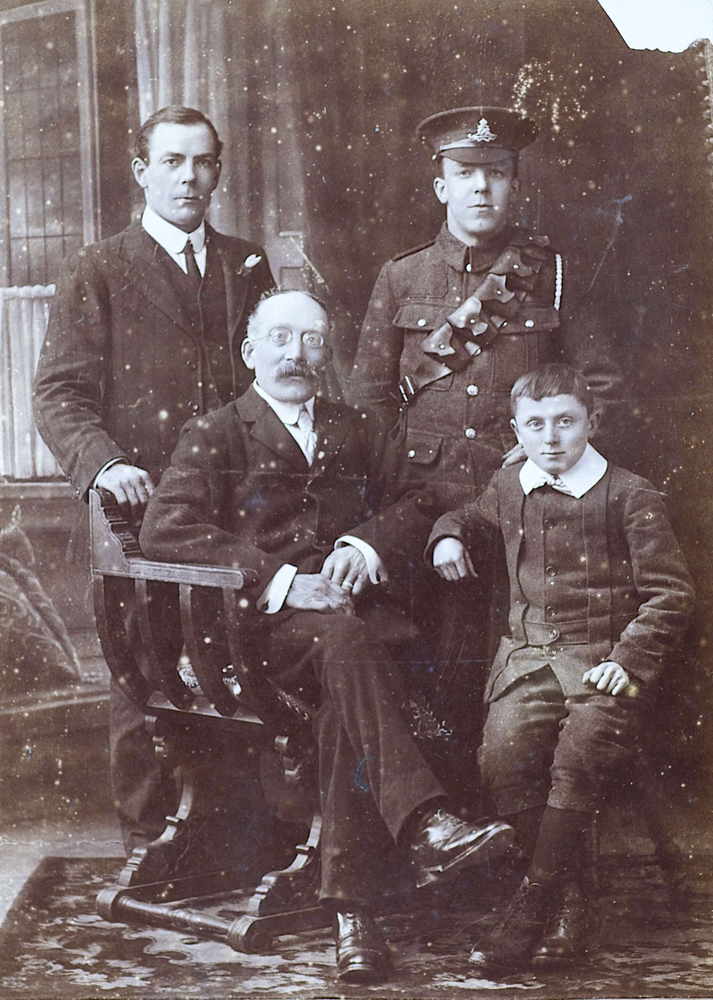
However, thanks to the advice of an Island GP – Dr Shone – who told the men to wait at the back of the queue in the hope that the transport boat was full, the pair were instead imprisoned in St Helier in 1942.
Mrs Falle, née Anquetil, said that her uncles, who owned guest houses, had had conscientious objectors who had fled to Jersey to escape conscription, billeted with them at their hotels.
However, during the course of their stay the objectors exposed Edmund Anquetil’s illegal wireless set and are thought to have done the same to his brother, Albert.
Mrs Falle, who was 13 when German forces invaded the Island, said that Edmund took a huge risk in keeping the banned device at his home – the Silvertide Private Hotel in Havre des Pas – as it was next to the Island’s Gestapo headquarters.
‘When the Germans found the crystal sets they also came to see my father, Clarence, and said, “You have a set as well”. But he didn’t.’
Mrs Falle, who has kept original Occupation records of Edmund’s imprisonment, including a hand-written letter from him to his wife Olivia asking her to send him salt, sugar and jam while he was locked up, has also written two books about the Occupation – Wartime Memories and Slaves of the Third Reich.
Being brought up in St Ouen as part of the Anquetil family she was raised speaking only Jersey French and French and did not learn English until about the age of six, when she started school in St Mary.
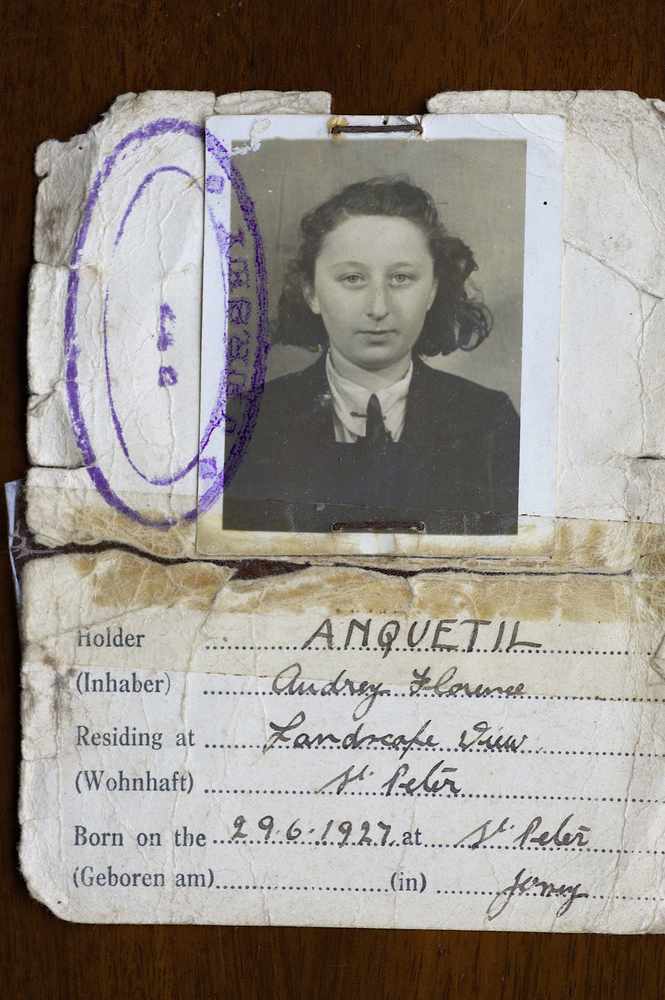
After finishing her education at Helvetia School she became a trainee medicine dispenser.
She believes that there may have been tension between Edmund and the man who exposed him to the Gestapo as Edmund had fought in the First World War and may not have approved of conscientious objection.
Her family has a proud history of service, with her grandfather, also called Edmund Anquetil, having won a medal – an equivalent of an OBE – for his work as a postman during the First World War.
Recalling the moment she prepared to wave goodbye to a large portion of her family she said: ‘I remember seeing them off down at the pier.
It was very tearful as I was saying goodbye to my cousins and aunts too.
‘They had all decided to go off together.
‘But Dr Shone told my uncles to stay at the back of the queue as the boat may be full.’
‘They were imprisoned over here in the end.
‘And come Liberation they were freed.
‘Weren’t they lucky they didn’t go to Germany?’
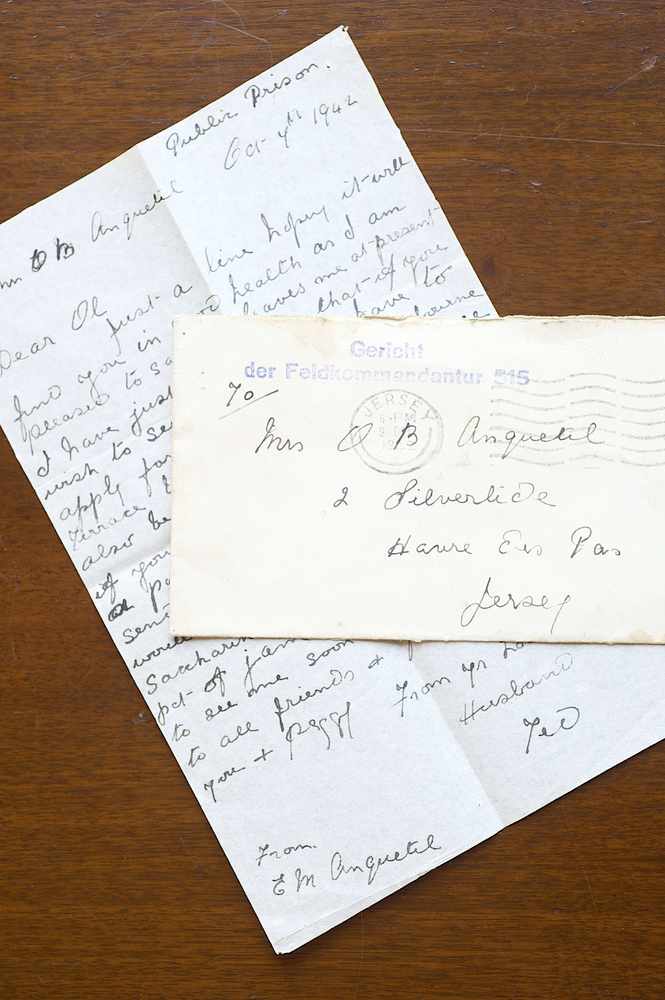
Having narrowly escaped being imprisoned in Germany, Edmund Anquetil wrote to his wife, Olive, in 1942.
On a small, now-faded piece of parchment, he wrote:
Dear Ol,
First a line hoping it will find you in good health as I am pleased to say it leaves me at present.
I have just been told that if you wish to see me you will have to apply for a permit at 1 Westbourne Terrace, Wellington Road.
You will also be told at the same office if you are allowed to send me a parcel and if so what you may send.
Hoping you will be able to see me soon with kindest regards to all friends and fondest love for you and Peggy.
From your loving husband Ted.
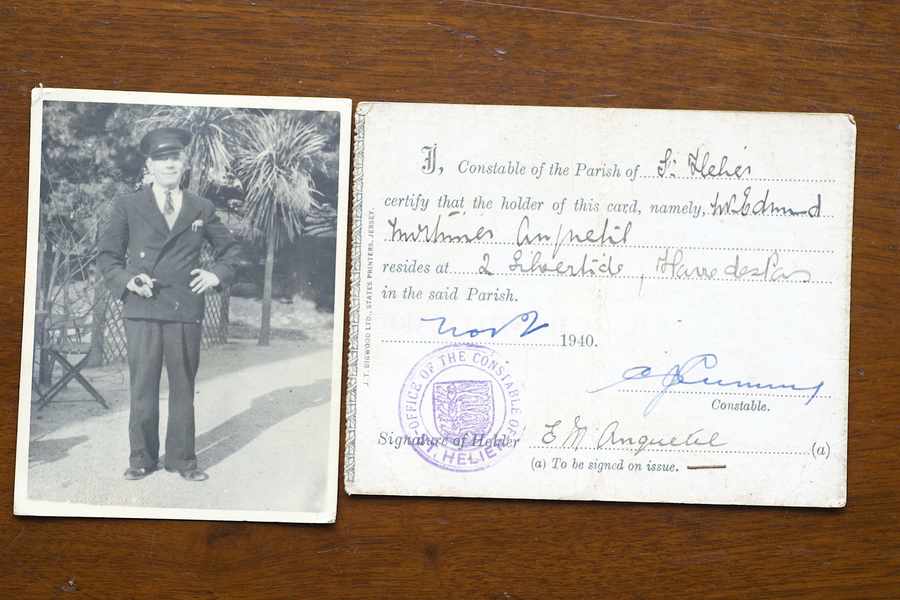
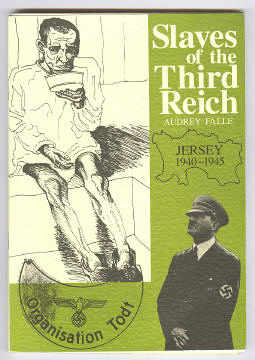
In her book, Slaves of the Third Reich, Mrs Falle describes Jersey in the 1930s and the leafy, quiet lanes and côtils that surrounded her home in St Peter.
She said: ‘The location was an absolute paradise and a dale of peaceful untroubled charm, a period of personal tranquillity that I have never experienced since.
‘This was Jersey in the 1930s, the Norman Island of undisturbed beauty.
‘At every turn one was confronted with some picturesque miniature valley and a succession of rock-fringed bays with noble cliffs, a myriad of mysterious caves and charming, attractive sandy beaches.
‘The Island, rich in prehistoric archaeology and its many peculiar characteristics, had a charm all of its own.
‘The Islanders were keen to preserve their patois (dialect), their local customs, and quiet way of life, which made us possibly the most contented population in the whole of the British Empire.’
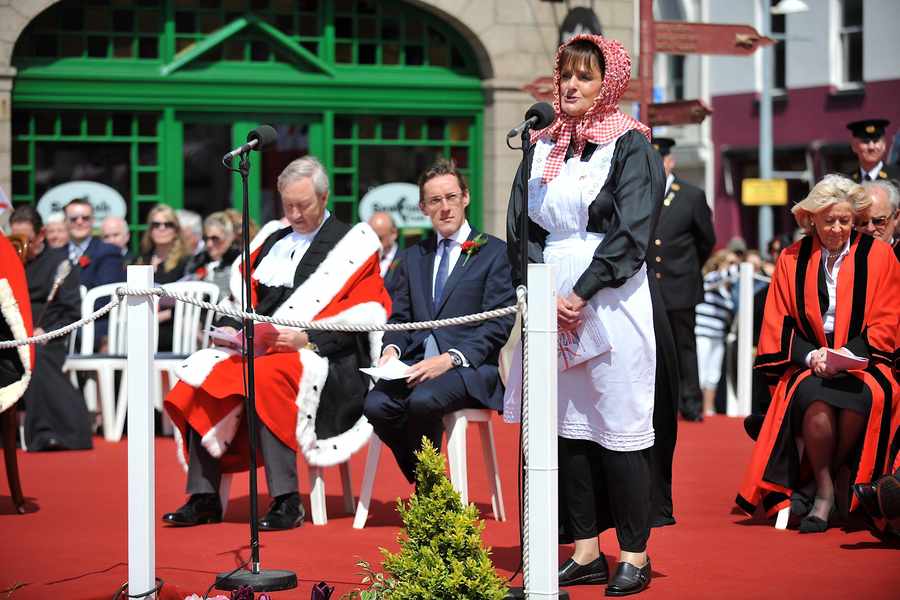
LAST week it was announced that the Bailiff had bowed to public pressure and changed plans for this year’s Liberation Day celebrations.
Following a meeting with community leaders and threats of boycotts, changes have now been made to the day’s schedule – in particular the events taking place in Liberation Square, where the programme will be extended.
However part of the celebrations, which will mark the 70th anniversary of the Liberation, will remain at The People’s Park.
The partial u-turn follows criticism that the focus of the celebrations would be the park rather than the traditional location in front of the Pomme d’Or Hotel.
The Bailiff’s Chambers said that the basic programme at The People’s Park would be maintained but the events at Liberation Square were being reviewed, with the programme there due to be extended.
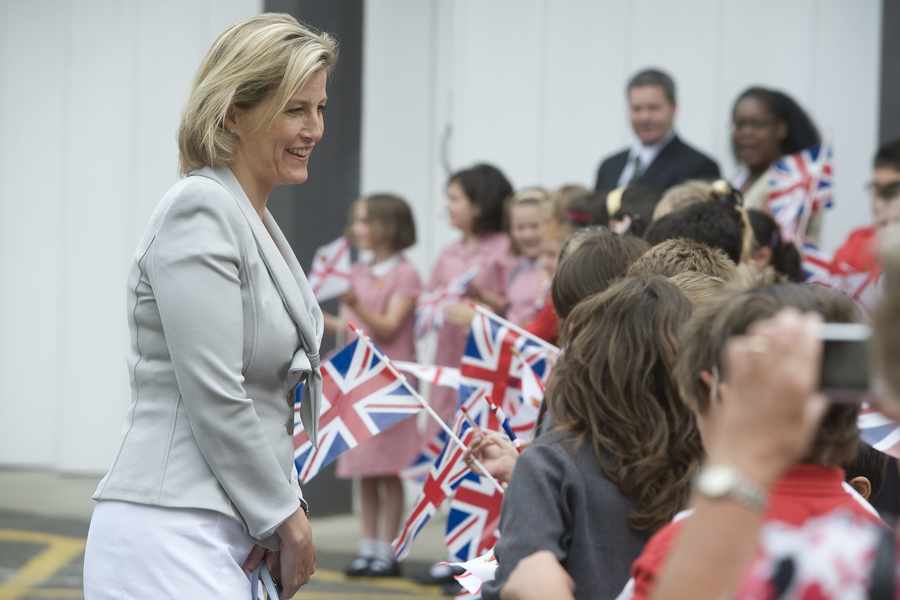
Mewnahile, a royal visitor will help Islanders celebrate this year’s Liberation Day.
Sophie, the Countess of Wessex will visit Jersey on Saturday 9 May to take part in the 70th anniversary celebrations.
During her visit the Countess, who is married to Prince Edward, will attend the community event at People’s Park.
However, Islanders will not be getting an additional bank holiday to mark the 70th anniversary of Liberation Day after Members overwhelmingly rejected a proposition brought by St Helier Deputy Sam Mézec calling for a day off on Friday 8 May.
It came about because this year 9 May – Liberation Day and the usual bank holiday – falls on a Saturday.
The proposition was defeated by 33 votes to nine.
IT is clear that many Islanders are upset about changes to the programme for Liberation Day celebrations this year, the 70th anniversary of one of the greatest days in Jersey’s history.
The hurt is particularly strong among some who lived through the dark days of Occupation and who feel unhappy that the annual ceremony is being moved to the People’s Park.
There are no doubt lessons to be learned for the future, not least the need to consult Islanders and communicate more effectively about why change is deemed necessary.
But it is now important that these disagreements are put aside and we focus on the greater goal of ensuring that the Island’s national day is not marred by division and acrimony.
We are where we are, and it is not now feasible to revert to the tried-and-tested running order with Liberation Square the focal point of celebrations.
Arguments can wait until after 9 May.

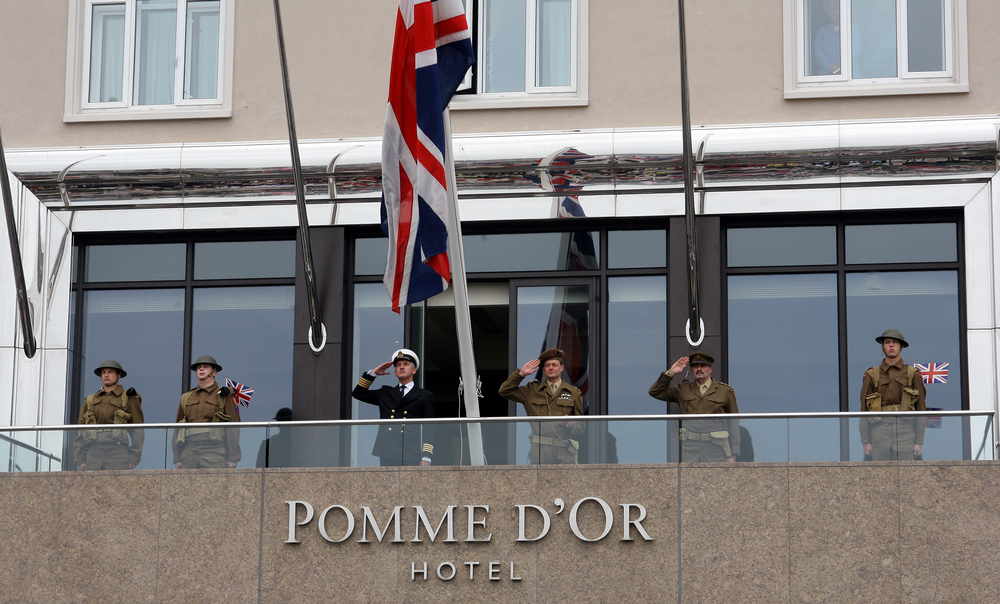
From René Garnier.
WHO moved the goal posts?
I was shocked to learn of the arrangements for the 70th anniversary of the Liberation.
On 9 May 1945 I was a small boy, having spent the first five years of my life under German rule. I walked with my three brothers and a sister from Georgetown to celebrate outside the Pomme d’Or Hotel. This was my first taste of freedom and I, like Terry Le Main, will treasure forever those memories of excitement at seeing British Tommies and the British flags being raised.
Wherever I have been, I have always returned to celebrate and commemorate Liberation Day, at first, at the Royal Square and afterwards at Liberation Square.
I am proud to say that I was the foreman in charge of the construction of this square, built to commemorate the 50th liberation of Jersey.
As Terry so succinctly put in his letter (JEP 13 March), to the ‘survivors’ of the Occupation, the focal point will always be the re-enactment of the flag-raising and the ‘Tommies’ passing through with sweets. The atmosphere in Liberation Square on 9 May in the past years cannot possibly be felt in People’s Park on screens.
Furthermore although I welcome youngsters taking part, the raising of the flag by cadets cannot take the place of the true enactment.
Last year was a superbly organised event, well balanced and thoroughly did justice to the people who survived and to the memory of those who did not. Why change it, if it’s not broke?
I will be in Liberation Square displaying my medal (given to school children in 1946) as usual, with my wife and friends and not at People’s Park watching a display screen.






